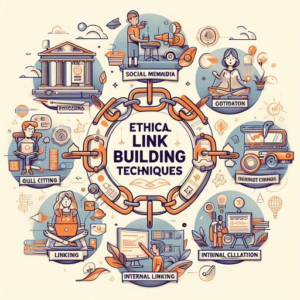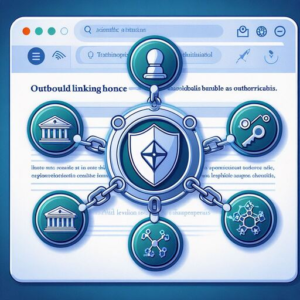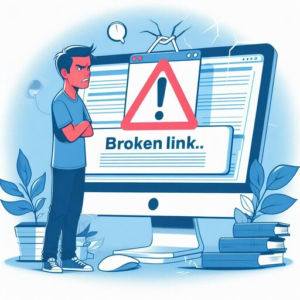Private Blog Network (PBN) link building is an SEO technique where a network of interlinked blogs or websites is created to boost the search engine ranking of a target website.
The strategy involves strategically placing links within the content of these interconnected sites, aiming to enhance the target site’s authority and visibility.

PBNs are controversial within the SEO community due to the risk of search engine penalties for algorithm manipulation. Despite potential short-term gains, ethical and sustainable SEO practices are generally recommended for long-term online success.
Caution should be exercised when considering PBN link building to navigate potential risks and consequences.
Section 1: Understanding PBN Link Building
PBN link building, or Private Blog Network link building, is a strategy used to enhance a website’s search engine rankings. It involves creating a network of interconnected blogs or websites, all pointing back to the main site. Think of it like a team of friends recommending your favorite book to others, making it more popular.
Section 2: How PBN Link Building Works
Imagine you have a favorite book, and each friend you tell about it becomes a supporter, spreading the word. Similarly, each website in a PBN acts as a supporter, linking back to the main website. These links signal to search engines that the main site is reliable and important, boosting its chances of appearing higher in search results.

Section 3: The Risks Involved in PBN Link Building
While PBN link building may seem like a shortcut to success, it comes with risks. Search engines like Google have strict rules against manipulating rankings. If they catch a website using PBNs, the consequences can be severe – the site might drop in rankings or even disappear from search results.
Section 4: Ethical Alternatives to PBN Link Building
Instead of venturing into the risky territory of Private Blog Networks (PBNs), ethical alternatives prioritize the organic growth of your website’s online presence. This involves crafting valuable content, engaging in collaborative efforts with other websites, and strictly adhering to search engine guidelines. Although these methods may require more time and effort, they pave the way for sustained success without the looming threat of penalties.
Alternative Approaches to PBN Link Building:
Steering clear of the potential pitfalls associated with PBNs, alternative approaches focus on building links through more authentic means.
These approaches include the creation of valuable and shareable content, establishing partnerships with reputable websites, and aligning strategies with the guidelines set by search engines.

Exploring Ethical Options Instead of PBN Link Building:
When considering strategies to enhance your website’s visibility, it’s prudent to explore ethical alternatives rather than delving into the world of PBNs.
Ethical options involve creating content that genuinely benefits users, fostering collaborations with other trustworthy websites, and ensuring compliance with search engine regulations. Although these approaches may demand patience, they lay the foundation for sustained and penalty-free success.
Ethical Alternatives for Building Links Without PBNs:
Building links without resorting to PBNs requires an ethical approach centered around creating high-quality content and fostering genuine connections.
By focusing on user value and adhering to search engine guidelines, websites can establish themselves as reliable sources, gradually building a network of organic and meaningful links.
Considering Ethical Methods as Alternatives to PBN Link Building:
Instead of choosing the questionable path of PBN link building, consider ethical methods that prioritize the long-term reputation and success of your website.
This includes creating content that resonates with your audience, collaborating with reputable websites, and maintaining transparency in your link-building strategies. Opting for ethical alternatives ensures a sustainable and penalty-free journey toward improving your website’s search engine rankings.

Pros of PBN Link Building:
1. Quick Results:
PBN link building can lead to faster improvements in search engine rankings compared to some other strategies.
2. Control Over Links:
Users have complete control over the links within the PBN, allowing for strategic placement and optimization.
3. Targeted Anchor Text:
PBNs offer the flexibility to use specific anchor text, which can contribute to better keyword targeting.
4. Cost-Effective:
Building a PBN can be cost-effective compared to other link-building methods if managed independently.
5. Ranking Influence:
PBNs can have a direct impact on the rankings of the linked websites, providing a potential competitive edge.
Cons of PBN Link Building:
1. Search Engine Penalties:
Major search engines, particularly Google, frown upon PBNs, and if detected, websites using them may face penalties such as ranking drops or removal from search results.
2. High Maintenance:
Managing a PBN requires continuous effort and resources to keep the network healthy and undetected.
3. Quality Control:
Maintaining the quality of content across all PBN sites can be challenging, risking the overall effectiveness of the strategy.
4. Ethical Concerns:
PBNs are often considered manipulative, raising ethical concerns within the SEO community.
5. Dependency on Network:
If a PBN is the primary source of links, a website might become overly reliant on it, making it vulnerable if the network faces issues.
Section 5: Frequently Asked Questions (FAQs)
1. What is the main goal of PBN link building?
PBN link building aims to improve a website’s search engine rankings by creating a network of supportive blogs or websites that link back to the main site.
2. Why are search engines like Google against PBNs?
Search engines want websites to earn their rankings naturally by providing valuable content. PBNs are seen as an attempt to manipulate rankings artificially.
3. Are there alternatives to PBN link building?
Yes, ethical alternatives include creating quality content, collaborating with other websites, and following search engine guidelines.
4. How can PBN link building affect a website if detected by search engines?
If a website is caught using PBNs, it may face consequences such as a drop in rankings or removal from search results.
Section 6: Building Quality Content for SEO
Rather than relying on shortcuts like PBNs, a more sustainable approach is to focus on creating high-quality, engaging content. This not only attracts organic links but also aligns with search engines’ preference for authentic and valuable information.
Conclusion:
In conclusion, while PBN link building may seem intriguing, it carries risks that can harm a website’s long-term success.
Ethical alternatives, such as building genuine connections and providing valuable content, offer a more sustainable path to improved search engine rankings. By understanding the nuances of PBN link building and choosing ethical practices, websites can navigate the complex world of SEO successfully.






